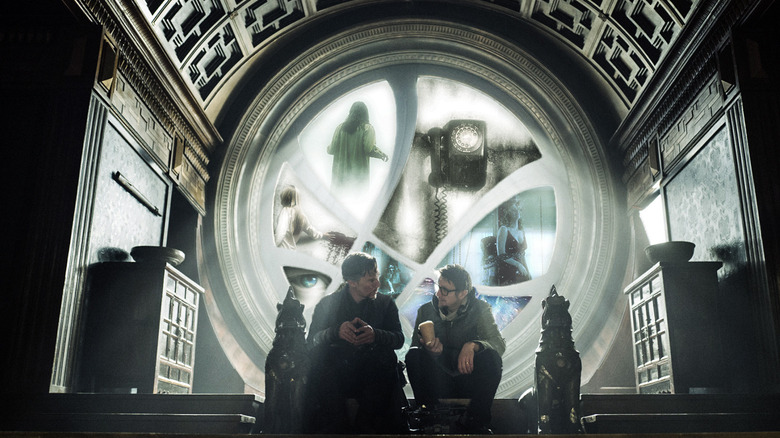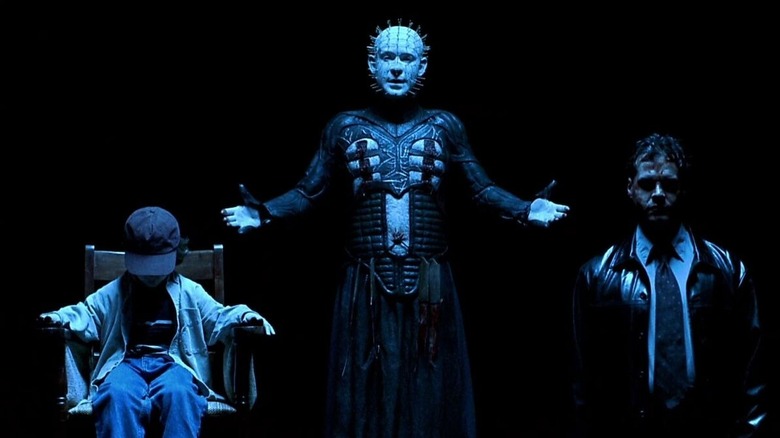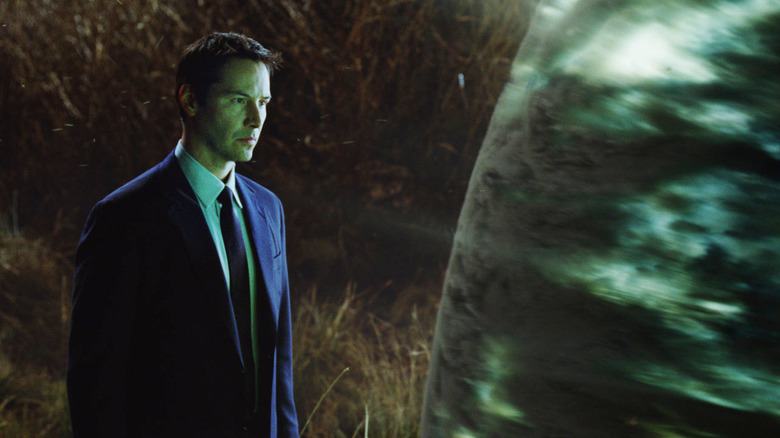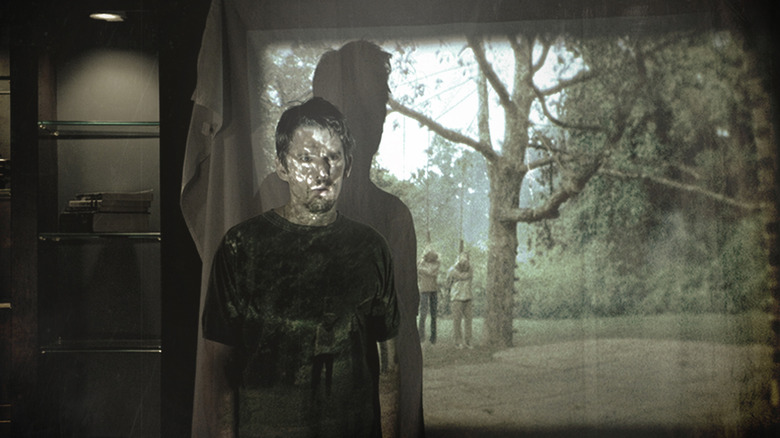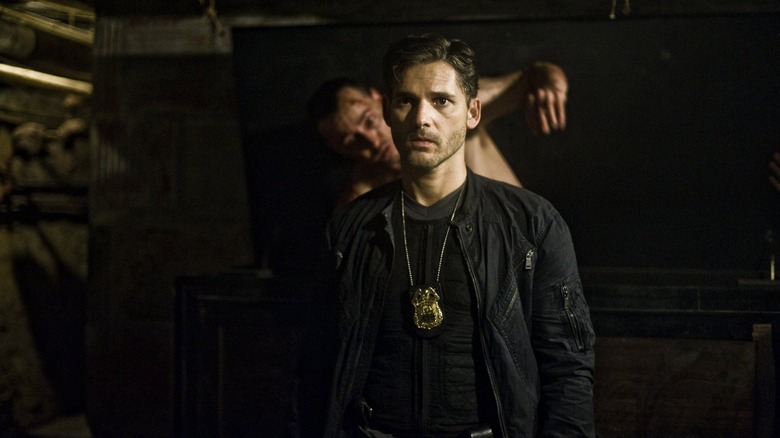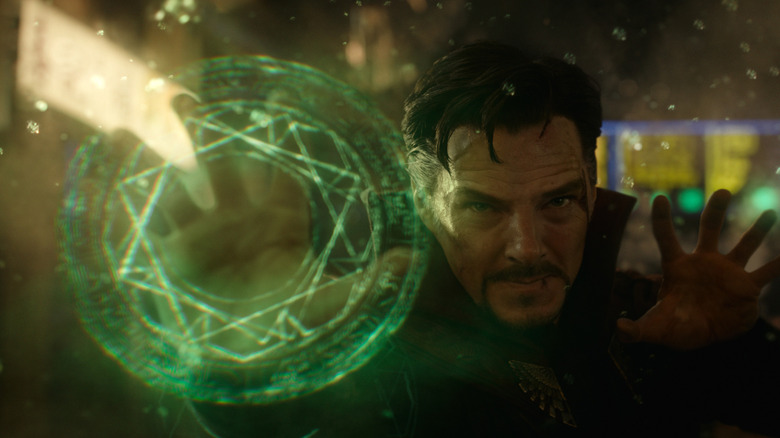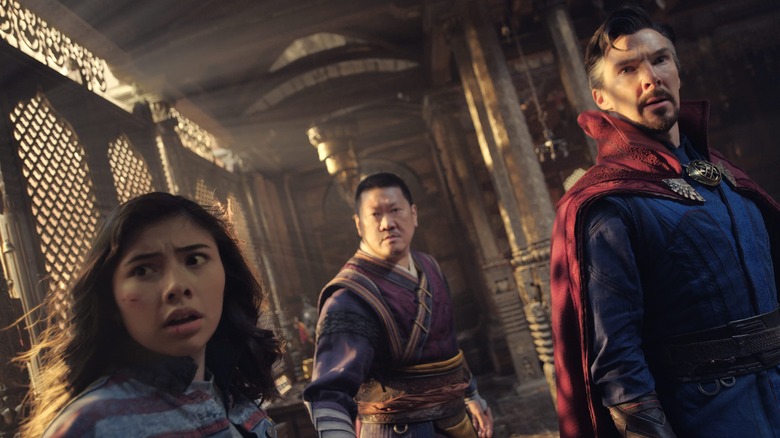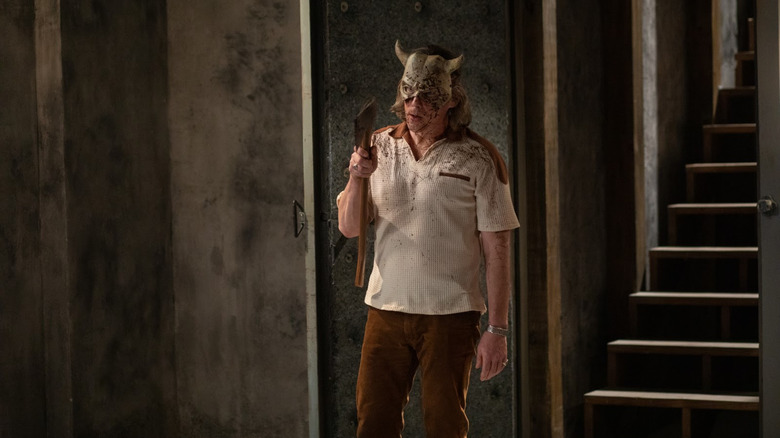Director Scott Derrickson Breaks Down His Entire Career, From Marvel To The Black Phone [Exclusive Interview]
Scott Derrickson has been working pretty steadily in Hollywood for just about 25 years now, and in that time, he's amassed a fascinating collection of credits. I had the good fortune of speaking with him recently about his pretty wild career from top to bottom. From his feature directorial debut "Hellraiser: Inferno" to his Marvel Cinematic Universe blockbuster "Doctor Strange," Derrickson has a varied resume, to put it lightly. From insanely high highs to borderline tragic lows, the man's career has endured an awful lot. Taken as a whole, his filmography is a compelling case study. It's also one that has a very clear "before" and "after" element to it.
The big moment of change, at first glance, was his 2012 low-budget horror hit "Sinister," a movie that helped establish the Blumhouse model of success in addition to being regarded as one of the scariest movies ever made. It's something I had the chance to speak with Derrickson and writer C. Robert Cargill about in detail when I compiled an oral history for the 10th anniversary of "Sinister." In truth, the real turning point for Derrickson came just before with his remake of "The Day the Earth Stood Still," which was, to put it lightly, not a success. From that point on, Derrickson treated every film differently. That's something we talked a great deal about.
In this conversation, we go through each movie in his career, from his early days helming a direct-to-video "Hellraiser" sequel, his time in the MCU, and even what he's got coming up in the future. What advice would he give to his younger self? How did Guillermo del Toro help pick him up during the lowest moment in his career? What was the deal with Joaquin Phoenix and Doctor Strange? We go over all of that and so much more. Derrickson was very open, gracious with his time, and spoke candidly about it all, good or bad. Let's get into it.
Here's the advice Derrickson would give his younger self
Let's start with "Hellraiser: Inferno." That was your feature directorial debut. One thing I noticed in looking this up is that's one of those movies in that franchise that's had a major resurgence. That's one people point out to you now like, "Hey, this is an underrated 'Hellraiser' movie." Have you noticed that? Or how do you feel about that, looking back at it now?
Oh yeah, it was a film that didn't get mentioned for 20 years and now people will bring it up quite often. It's surprising.
You've had a lot of experience since then. But what would you go back and tell the Scott Derrickson of the past right before he was about to head into that experience? What advice would you give younger you?
I'd give myself the advice that I give all young filmmakers. I think it's a lesson that I learned in part on that movie, which is that your movie can never be better than your lead performance. Not that I think Craig Sheffer gave a bad performance, but I think there was a lot more to be done with that performance that could have made that movie better. There's a lot of interesting filmmaking in it considering how low the budget was. It was a direct-to-DVD movie and was intended to be that. But the script, I think, was better than the movie that I made. I think part of that reason was that I had not given as much attention to the nuances of the performance as I did to the complexity of what I was trying to pull off cinematically as a director.
It's a lesson that a lot of filmmakers — and especially film students — learn the hard way, which is that no matter how good your movie is, no matter how interesting the visuals are, and even how good your story is, the ceiling for the quality of any motion picture is the performances of the lead characters. I think there was more to be gotten out of that movie if I had given more attention to it. But I also think it could have been scarier. I think there were certain things that I hadn't really learned yet about suspense and how to maintain it. I think those would be the two things I'd probably try to talk to myself in the past about if I could.
I'm guessing from the way you talked about the performance there, has that impacted the way you cast ever since? Or is it just more the way you handle performers during the filming process?
I consider performances the most important thing in every film I've made since then. I think everything that I've done since then, I've cast it very deliberately and I've been fortunate to be able to get really great actors. I did "[The Exorcism of] Emily Rose," which I'm sure we'll talk about, getting Jennifer Carpenter. I looked hard to find somebody as good as her for that role, and I had Oscar-nominated actors in the other roles.
But I think the real point is that I had some theater experience in college. We certainly learned a lot about acting as a full-time writer, and that just became my focus from that point forward — that performances are paramount. They're the most important thing, even when you're making a genre film.
Let's talk about "Emily Rose" for a second. It made $150 million worldwide on a $19 million budget. I think any studio today, if you offered them those terms, they would jump at it. There was a quote of yours in an interview with Kevin Smith from back then, if you may allow me. It said, "I told my attorney the next time you're negotiating my net profit for a movie, ask for a sandwich instead."
I believe it was a ham sandwich. I think I specified ham sandwich.
It was a ham sandwich. You are correct. I left out the word ham. For people that maybe aren't as familiar with the industry, can you talk about that? Because I think for most people, that would sound like success, but that quote speaks to the level at which, maybe from a filmmaker's participation in that success, not so much.
There's two kinds of participation that you can have, and that's net profit participation and gross profit participation. A form of gross profit participation is what's called cash break participation. Cash break is where you have the amount of the price of the movie, and you have the cost of the movie, and you have the cost of marketing, and that's the cash break. After that, you're into profits. If you have gross participation, generally you start to participate in a percentage of everything that's made after that cash break. If you have what's called first-dollar gross, then you can just open your browser, see how much money the movie made over the weekend, and you know exactly how much of that you're going to get.
Yeah, and that's exceptionally rare. Guys like [Christopher] Nolan get that. Tom Cruise.
That's very rare. Net profit is something that is defined by the studios in very creative ways. It sounds good. I think I had a 5% net profit participation in "Emily Rose." Like you said, the movie cost 19, it made I think $75 million domestic and about $150 million worldwide, and it is not considered a net profit movie. So there are stories of one or two movies that I've heard of that got into net profits.
I don't know a lot about it, I don't know exactly how it works. It just seems ridiculous to me that we negotiated that amount and it didn't apply. But we audited the studio and everything was done according to the rules. So nobody was doing anything shady as far as the bookkeeping goes. But I do know that part of what they do is their net profit definitions have to do with I think their fiscal years or their overall net profits as a company. Because the majority of movies don't make money. Most movies lose money, and at the major studios, they count on their biggest hits to offset the losses of the movies that don't make money.
So when you have a movie like "Emily Rose," it was a big hit and made that studio a lot of money. It was also compensating for movies that didn't do so well. That's how that works, as I understand it.
Guillermo del Toro helped save Scott Derrickson's career
That is the most logical explanation I've ever heard for that, because there are times when you'll look at a movie and you'll go, it just seems criminal that people are saying they technically never made a dime on it. Mentioning that movie clearly performed well, was there ever any talk of a follow-up of some kind with that? Or was that always just a one-and-done thing?
It was one-and-done because I mean, what are you going to do? "The Resurrection of Emily Rose?" She dies in the beginning of the movie. I felt like with that particular story too, I had a real sense of personal responsibility about that movie. It was based on a real person who lost her life. Even though there's some Hollywood fanfare in that movie, there's a lot of loyalty to the story that the real girl, Anneliese Michel, the movie is based on, to her own story as she understood her own story. I felt a responsibility to be true to that in a significant regard. So the idea of fictionalizing a sequel in any way just felt really wrong to me.
I don't want to spend too much time on this one because I know this is maybe, if I were to guess, a sore spot. "The Day the Earth Stood Still." You touched on this a lot last time we talked, but I think my biggest curiosity here: There is "The Day the Earth Stood Still," and then there's a three-year gap where you're not really making movies and a four-year gap before "Sinister" comes out. What's happening in that three to four-year period between when that movie comes out and before "Sinister" comes out?
Oh, terrible. It was a really difficult time. I thought my career was over. A lot of what "Sinister" is about is the feelings of fear that I was experiencing during that time. Ellison Oswalt's character is very much based on my own sense of like, "Oh, he was a golden boy and wrote this great thing that made him famous and got him a lot of money. Then the follow-up was a failure, and now he's scared. He's scared of losing his status and he's scared of losing his financial security," all those things. I didn't like the amount of fear that I was feeling. When I look back at that period, I think what I was doing more than anything else was reckoning with how I was going to continue to feel and relate to my career in the movie business if it continued. Because from that point forward, there were certain things that really changed for me, very deep things.
It was an incredibly wonderful event in my life, as difficult as it was. That is the movie that taught me not to rely on the success of a Hollywood career for your personal strength and sense of self. I really haven't done that since then. My successes and failures don't have a big impact on my own sense of self and what I value in the world. That was not the case before that movie.
As a filmmaker, it really cemented in the bottom of my soul a conviction that I would never again find myself at the end of somebody else's movie. If I was going to die on a sword, it's going to be my sword. I've walked off films for that reason because I promised myself that I would never do that again.
That's really fascinating. I know you said you got offered some stuff in that period, like "Ghost Rider 2." I'm guessing that's why you just turned down what might seem like a survival job. Or I don't know what else you were offered around that time, but I'm guessing that's why you turned all that stuff down?
It was both a sense of conviction about what it is that I felt capable of doing and making. I was not going to be seduced by a big studio waving its paycheck at me again. But also I felt like the movies that were offered to me, if I made them, they would probably be the last movie I would make. When I got the opportunity to make "Sinister," I thought, well, this still might be the last movie I get to make, but it's going to be my movie. I had final cut. It's the only movie I ever had final cut on.
We had talked a lot about that last time. That was your big thing. You put it all into that because that was what you felt like, "Okay, if this is it, this is my movie and nobody else's."
Yeah, it was Guillermo del Toro that really put my head straight about this. I happened to be going to see him up at his haunted manor in Agoura shortly after the release of that movie. I went and saw him, I just said, "I'm bleeding inside." The movie was a critical and financial failure, "The Day the Earth Stood Still." I knew that it wasn't my movie, and I explained to him the very complex thing that happened on that movie. Nobody was trying to make a bad movie. It was a very, very complicated situation that I think everybody got victimized by.
I told him, I think I used that phrase for the first time, I said, "I just feel like I found myself at the end of somebody else's movie." He said to me, "You're a talented guy. I'll give you the advice. If you take my advice, you'll be fine. You'll be just fine. But you have to do what I tell you." I was like, "Okay, anything." He stuck his finger in my face literally and just goes, "Don't do that again." I've never not had that ringing in my head since that moment. I think it's one of the reasons why my career has gone well, because I have refused to do that again. I've refused to go down the trail of tears that can possibly or likely end up being my own death on somebody else's sword. I'm not going to ever let that happen.
That's the most Guillermo story I think I've ever heard.
Yeah, he was like an angel on the roadside at just the right time. I mean, it was really a very helpful thing that he did for me in just saying that very simple thing.
Derrickson's favorite Sinister scene isn't one you'd expect
You and I talked a great deal about "Sinister" in our past conversation, so I don't want to drone on too much about that here. I would say that if we're looking at your entire filmography, that's your most successful film in some ways, so we should probably talk about it at least a little bit. Looking back, you've now established yourself as this big voice in horror. What is your biggest takeaway more than 10 years later, looking back at that film now?
It's a film where I did everything right on that movie. It's interesting because I don't value the experience of that movie nearly as much as "The Day the Earth Stood Still." If I could erase the experience, the personal experience of any of my films, the last one that I would remove is "The Day the Earth Stood Still," because I learned the most from it. I learned 10 times more from that experience than the experience of any of my other films. What was nice about "Sinister" was that we wrote it fast, we shot it fast, we edited it fast. I think it was released less than a year after we wrote it, which never happens. Then it was a big hit. I think a lot of that has to do with the fact that I had learned my lessons and they were so internalized.
I think I was so adrenalized by a different approach to filmmaking and how to do it. But I also was very fortunate because I got Ethan [Hawke] for that movie. Again, there's a lot of great craftsmanship in that film. I think I'm very proud of those Super 8 kill films. I still think they're very disturbing and very cinematic, but the heart of that movie is performances by Ethan and Juliet Rylance, especially. I think probably my favorite scene that I've ever shot is the domestic argument in the back bedroom between the two of them because it just feels so raw and real, and very much drawn from my own life. I've still never seen a scene quite like that in a horror film.
Yeah, I love Ethan Hawke. He's one of my favorite actors. As you know, I love "Sinister." I just think that one of the real shames of his career is that he's never going to get the credit for the shockingly good performance that is in that movie. That is one of his best performances. I couldn't agree more. It's incredible.
I think it's coming around, though. I think the attitude, certainly the online attitude toward horror, has really grown greatly in the last decade, and the last five years especially. I think people respect it in ways that they didn't.
This is true.
You mentioned "Hellraiser." That movie gets brought up a lot, but no film that I've made has grown more in its stature than "Sinister." It has taken on a second, and third, and fourth life, and seems to be getting a lot more popular with time. I think part of that is recognition for how great his performance is in that film.
I agree. I think it was an interview with Inverse recently that someone asked you about doing "Sinister 3." And I think you said possibly. So is that something you're really not ruling out at this point, or have you just thought more about it?
No, really not ruling it out. I mean, I think "Sinister" as a television series is a really interesting idea. I think it's good. I think the mythology, I wouldn't bring back any of those characters. I don't think that's the way to do it. What I love about "Sinister" is that it's based on a pagan deity and it's an occult mystery. It's an investigative thriller. I think that you can branch out that mythology and create more stories exploring the realm of the pagan deities connected to Bughuul, and how they would affect other lives and other households and that sort of thing. I think there's a mythology there that's worth expanding if it could be done the right way.
Scott Derrickson thinks the release date killed Deliver Us From Evil
Let's go to "Deliver Us From Evil," which is this fascinating movie I find sandwiched between two monsters of their own right. I don't know if you saw it, but "Deliver Us from Evil" was trending in Netflix's Top 10 heavily recently. Did you see that?
Yeah, it was trending at number two for three days.
How did that make you feel?
I was shocked. I was really surprised [laughs].
I'm a bit of a box office nerd. One of the things that fascinated me looking over this — who decided that was a summer movie?
I'll tell you a great story about "Deliver Us from Evil" and that date. I do think that date killed the movie.
Okay, please.
What happened was it was slated to be a ... I heard a blogger one time say, "It's a 'f*** you, it's January' movie." There's a certain kind of movie that's like, "F*** you, it's January. Here's this." They tend to be these grimy, grittier, darker, trashier movies. We knew the movie was going to be released in January, and I felt great about that. I thought that was the right thing to do. It felt like a January movie to me. It's just the rainy, noir, grittiness of that film and the ugliness of the whole possession story. When we finish the movie, here's what people don't know, you do test screenings to test how well a movie does. "Deliver Us from Evil is the highest-testing movie I've ever made.
No s***!
It tested higher than "Doctor Strange," and tested higher than "Sinister." The studio loved it. When the studio saw it, they thought they had "The Conjuring." So, as soon as the head of the studio saw the movie, they immediately moved the date from January to, I think it was late June or early July.
It was sandwiched between "Transformers [Age of Extinction]" and "[Dawn of the Planet of the Apes"].
It was sandwiched between two giant behemoth summer movies. It's just not a summer movie. The thing about "The Conjuring," it's a s*** scary movie. But "The Conjuring" is still funhouse horror. "The Conjuring" is really fun to watch. "Deliver Us from Evil" is not fun. It's not meant to be fun. Everything about the movie just was bad. After it came out and the critics didn't like it, and it didn't open the way we wanted it to, I was devastated. I'm very proud of that movie. I think that's a good movie. I really don't care if anybody takes me to task for that. People, critics, and bloggers who don't like it, whatever man, that's fine. If you don't like it, you don't like it. I hit the target that I was aiming for in that movie.
I called [producer] Jerry Bruckheimer after the opening weekend, and I said to him, I said, "What happened, man?" Because Jerry liked the movie a lot too. His answer was, "The movie tested too high." And I just go, "What do you mean?" He goes, "It tested too high, so they moved it in summer and the marketing, they thought it was going to market itself somehow. They just thought the movie was just going to sell itself, and it didn't." That's what happened. That was Jerry's take on it.
That's wild. Jerry Bruckheimer, by the way, one of the nicest guys I've ever spoken to.
I love Jerry so much. I learned so much working with him on that movie. It was one of the great privileges of my career. He was the real producer. He was the onset producer, he was the developing producer. He was involved in everything. I learned so much from that guy. Yeah, he's a wonderful person and he's always polite and very kind. He's also so smart and so no-nonsense.
I remember we were shooting in the rain in the Bronx every night in June. It was always cold at night and it was always raining. We were shooting an entrance of characters entering the house, and he didn't mess with me much during production, but he would just come up and he would say these things, and he walks up to me and I'm at the monitor and he says, "You're shooting too many entrances and exits." I said, "Really? Why do you think?" He goes, "Most of them are going to be on the cutting room floor and you're using too much shooting time. You're shooting too many entrances and exits." I said, "Yeah, but this house, this family, and this is..." I start to explain, and he just interrupts. He goes, "I don't know a lot of things, but what I know, I know. And I know you're shooting too many entrances and exits." And so I was like, "Okay, Jerry. I got it." I started shooting a lot less. And sure enough, most of the ones I did shoot ended up on the cutting room floor. He was absolutely right.
He's one of those guys, you look at his resume, you're like, yeah, if you're going to believe anybody...
Yeah. I mean, he's one of the great producers in film history. He's one of those real film icons. I also am really proud of the fact that "Deliver Us from Evil" feels like a Bruckheimer movie.
It does.
And I wanted it to. So yeah. Yeah, that's great.
Disney agreed to lose money in order to have Benedict Cumberbatch play Doctor Strange
People always talk about Robert Downey Jr. as being perfect as Tony Stark. I don't think you get more perfect than Benedict Cumberbatch as Stephen Strange. That aside, I think the one thing you don't get nearly enough credit for seven years removed, is introducing the cosmic side of the MCU very successfully [in "Doctor Strange"]. That has become such a crucial part of everything that's gone forward. If that doesn't work, I don't know what the MCU looks like today. That's the thing I think stands out to me the most, looking back at this movie now.
The cosmic side and also the language of how that's represented. I certainly didn't have my eyes on that target specifically, of how it would be used in the future. But I was very fortunate in that not very many Marvel directors get to step up to the plate and make an MCU movie that doesn't have any obligations to the MCU. When I was making it, it was a complete standalone movie. There were no characters from previous films in it. There was nothing that we were deliberately setting up for future movies. It was its own film. I think there's a purity to it for that reason that I have always been very happy with.
This was back when I was following as a fan before I was doing this full time. I was following every rumor about this movie that I could eat up at the time. Obviously, Joaquin Phoenix got close, and there were a lot of people that were talked about. I even heard a rumor that Ethan had talked to you about it. I don't know if that's true or not. But how close did Joaquin get and how did you eventually circle back to Benedict?
I want to be respectful of Joaquin's privacy, and I don't want to really talk too much about that. He's a private guy.
If you'd rather not talk about it, I'm okay with that, too.
Well, all I'll say is I spent some time with him. I spent a couple of long afternoons with him and really was really impressed with him personally and his thought process. This is what I'll say: I think he was giving, I think he was opening his mind to the possibility. I think he was investigating the possibility. What happened, just to be clear, we offered the movie to Benedict. I wanted Benedict. That was my choice for the role. I flew all the way to London to try to talk him into doing it. What it came down to was that it was a summer movie, and Benedict had committed to doing "Hamlet" in London theater.
Benedict, he's a guy with great integrity, and he understood the significance of what the role was and how it could impact his life. But he just said, "I've said yes to these people. I've committed to doing this. I can't back out of it." He just personally wouldn't do that to the theater and to the director of the show. So I came back from that trip and I was like, "We're not going to get Benedict."
I met with a bunch of actors, and Joaquin was the one that I spent the most time with. As we continued to talk, it became clear to me that Joaquin didn't really belong in that movie and probably never belonged in the MCU. He's a very specific guy with very specific goals as an actor, and a very specific way of performing. I think it became clear to both of us that this might not be a good fit, really is what it came down to.
So after giving that a shot — we didn't have a script, either. Keep that in mind. I think what he was very nervous about was he'd be committing to multiple movies, which is not the kind of thing he's ever done. I just went back to Kevin [Feige] and I just said, "We have to move the date because it's got to be Benedict." Kevin went to Bob Iger and Alan Horn, and told them what I said. To their credit, they moved the date and it became a fall movie.
Oh, that's incredible.
We moved the release date to get Benedict.
I think in hindsight, everyone would look at that and be like, yeah, that was a good call.
It was a lot of exploring on everybody's part, and everybody gave it earnest consideration of all things. In the end, it came down to the heads of Disney knowing they would make less money on the movie, but letting me as the director have the right actor for the movie. I just told them, I said, "It has to be him. There's no one else who's going to do what he can do in this role."
No one will ever see Scott Derrickson's Snowpiercer pilot
There was the credit scene in that movie, which I was very excited about because I am very aware of Mordo's arc in the comics, and I felt like I could see where that was connecting. That still hasn't really been addressed in the MCU to date. [C. Robert] Cargill at one point had talked a little bit about what your guys' plans might have been. I had heard Nightmare was going to be your villain. I get the sense this isn't ever going to happen. Could you talk at all about what you were planning to do with your sequel, or was that something you'd rather keep to yourself?
That's something I'm going to keep to myself. I think everything about that decision, I've been very, very committed to not sharing information about it out of respect for Marvel and for the process that we went in. But I'll say the same thing that I've always said, which is we didn't leave on bad terms. It was genuinely a creative difference. Everybody saw the writing on the wall. This is not how this should go. I've never regretted my decision. I've never resented Kevin or Marvel for how everything went down. So that's really all I have to say about it.
Another thing I want to explore is, then you have another large gap before you direct another movie after your biggest commercial success.
Well, keep in mind, I was working on "Doctor Strange 2" for a year and a half before I left.
My question was going to be: What's going on in that time between you directing "Doctor Strange" and you directing "The Black Phone?"
Two things happened. One, I spent a year and a half working on "Doctor Strange 2," and I also directed a pilot for "Snowpiercer."
Oh, that's right.
Another situation that I can't really talk about. All I can say is that I loved the pilot that I made. I loved it. The show got picked up based on that pilot. When the showrunner left, my friend Josh Friedman, then the only way they were capable of getting another showrunner in was by starting over. So it wasn't that the pilot wasn't good. I loved the pilot that I made, and so did Josh. But when he was no longer going to run the series for "Snowpiercer," the new showrunner wanted to shoot a new pilot. And they did, which was heartbreaking for me.
Do you ever think there's a chance that pilot is going to see the light of day? Probably not, right?
Never. No. No one will ever see it.
Why Scott Derrickson decided to make The Black Phone 2
That's a shame. I don't want to make you talk about "The Black Phone" too much, just because that's your most recent movie. You've done a ton of press about it. But the one thing I will say, "The Black Phone 2" is going to end up being the first sequel to one of your movies that you're actually going to make. So how did that come to pass?
It just came up. I have a take on it. I would not have done it. I didn't feel obligated to do it. Of course, the studio really wanted me to do it. But for me, when I talk about that period after "The Day the Earth Stood Still" and certain things that I came to believe, some of those things have literally become mantras. One of the mantras is that every film that I'm going to make, I'm going to make it as though it's the last film I'll ever get to make because one day, it will be.
I had to ask myself the question: Is "The Black Phone 2" a movie that I'm willing to make if it's the last movie I ever get to make? I spent some real time thinking about it. When I came up with a story or a take on that movie, it got me so excited. I was like, absolutely, that is the next movie I want to make. I love the potential of what it wants to be.
So for me, it's all about that. It's all about whether or not something feels like it's the best possible film that I can go make at any given time. It has to have some kind of real personal connection to me, or I don't have the proper fire and enthusiasm for it. Which, again, "The Day the Earth Stood Still" is the only movie I made for which that was not the case.
I've got one more quick one for you. "The Gorge" is your actual next movie, and I believe you're in post-production on that. Not much has been said about this movie, so I know you probably can't say much of anything. But how does this fit into your filmography? Is it another big blockbuster-y type thing? Is it another horror thing? What can we expect from this movie?
I love that people don't know about this movie. I'm going to leave that a mystery. I will say it's not a small movie.
"The Gorge" does not currently have a release date, but stay tuned.
